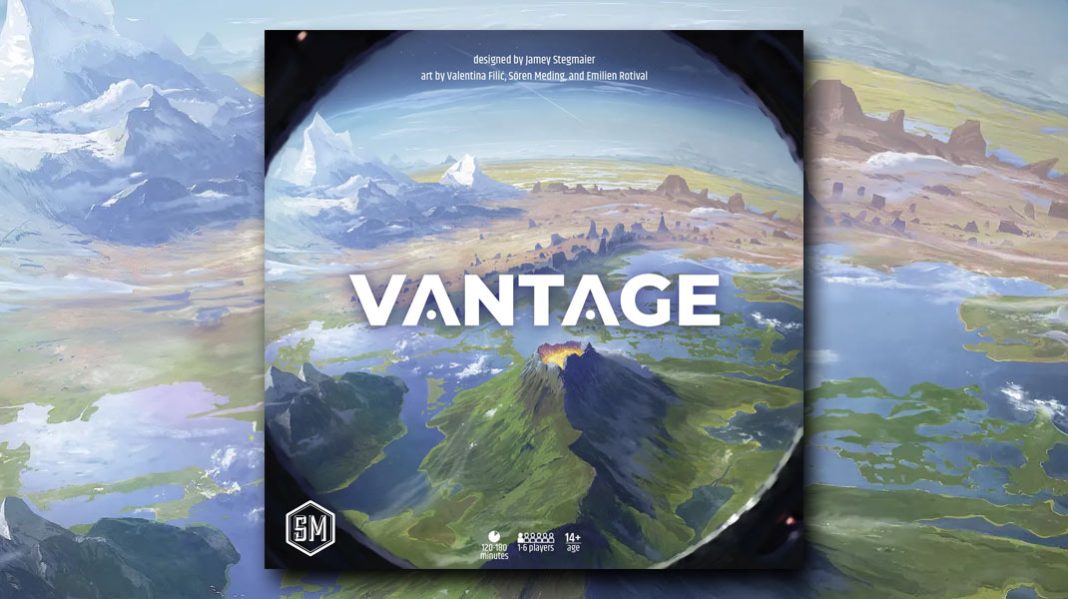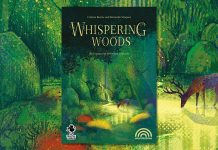Publisher: Stonemaier Games
Player Count: 1-6 Players
Game Length: 2-3 Hours
Complexity 2.25/5
In this narrative-driven, open-world, exploration game, players must navigate the terrain of a distant planet, choosing their own path, meeting strangers, gathering resources, gaining companions, surviving the elements and exploring the great and the small of these mysterious surrounding.
Vantage isn’t your typical structure-based, strategy game. While there are mechanics and turns, it certainly doesn’t serve up the gameplay as the main course. This is an experience where the story is the game and developing it within the very loose structure is where the appeal will lie.
While some might be quick to write this off as another “Choose Your Own Adventure”, it couldn’t be further from the truth. When it comes to world-building in the board game space, Vantage brings a richness and complexity that is entirely unparalleled. It takes you down the rabbit hole and then lets you choose between 6 additional rabbit holes… and 6 more rabbit holes and 6 more rabbit holes after that until you’re completely emersed and at the mercy of your choices.
It’s part RPG, as you’ll equip your character with items you may not know the use for yet, companions who may only serve your benefit briefly or goals you’re not quite sure how to accomplish. These resources not only benefit you for their face-value, but serve as sources of experience and knowledge to help grow and expand your character to satisfy greater and more risky challenges ahead.
This isn’t a campaign, but a series of 2–3-hour adventures that begin in a unique way and playout differently every time. Strangely, despite all these lauded aspects, I personally haven’t run across a game this divisive to the extreme in a while. So, my hope with this review is to showcase the structure of the game, the experiential mindset and construct some expectations to help you determine if Vantage is for you.
ON YOUR TURN
Players have 3 primary areas to consider: The player board which tracks your 3 attributes (health, time & morale), your card grid which displays your character and carry-a-longs and your location card.
Throughout the game, you’ll travel across multiple location cards. Each card features an intentionally illustrated look at that location and a series of 6 actions available. These actions, while expressed differently depending on the card’s context, are rooted in 6 basic game actions: Movement, Look, Engage, Help, Take or Overpower. Your character starts the game specializing in one of these categories, but you have the power to continue on that trek or mold your character as you see fix. Just because you’re one more likely to Engage doesn’t mean you can’t Overpower (fight, etc.) or Help.
You can only choose one action per card per game placing more emphasis on each choice. This means rejecting 5 options, their benefit and their storylines in exchange for the choice that best suits you in a particular moment in time.
Actions are always successful, but like choices in life, always deliver consequences. Once you choose an action, you’re directed to roll a specific number of challenge dice. These challenge dice reflect the action’s investment and effect it has on you personally. Did it wear on your morale, affect your health or take too much time? These are the survival pillars of the game and ultimately exhausting one ends your adventure.
Fortunately, travel and choices breed resources and experience in the form of cards that strengthen your ability to absorb these challenges over time. Gaining a weapon might allow you to place a die when you choose an Overpower action. Gaining a companion might help absorb specific die rolls when you’re in a certain terrain. In a sense, your player grid is an evolving tableau that can potentially pattern your player to better accomplish certain types of actions. Additionally, some cards can be upgraded to more power advantages.
As you choose these actions, you’ll be prompted with a story blurb describing the outcome of your choice. This wildly varies and I’d hate to ruin any surprises, but the outcome could be as simple as gaining credits, a new resource card, whisking you away to a new location or opening a door to a new challenge.
Vantage is very loosely structured, but each game will give you a mission objective as well as possible Destiny and Epic victory conditions. How and if these conditions can be met will be up to you. Vantage is very clear that success in the game is first and foremost dependent on how you define it.
This is only the tip of the iceberg when it comes to your possible experience. There are so many different things that pop up throughout the game that might serve as a side-mission or viable distraction giving you loads of freedom to see this one through as you see fit.
WHY VANTAGE IS FOR YOU?
Vantage is your scene if you love the idea of an open world with minimal constraints and structure. Are you ok with “wandering” just to get a look at what’s over the horizon? Do you enjoy the idea of not just exploring the landscape, but the items you discover and series of side quests that can be embraced without the promise of a resolution? It’s all in the spirit of discovery.
Again, this is a game where the narrative takes center stage. You’re not quite along for the ride as you have plenty to do and lots of choices to makes, but the story is the game. There isn’t anything guaranteed and the satisfaction of the game comes in the unknown and being able to interact based on past decisions or just on plain impulse. It’s a bit of a survival game, but the tone is hopeful and almost joyful. There’s a brightness (even in the darker recesses of the planet) that feels almost leisurely and stress free.
WHY VANTAGE ISN’T FOR YOU?
It probably goes without saying at this point, but If you’re hoping for a strategy game with tight parameters or standard board game mechanics, you’re probably going to be disappointed. Not to say there isn’t strategy, resource management, set collection, optimizing or calculated choices involved, but they’re baked deep inside the cake and often won’t let you control them like you would in a standard board game.
It’s difficult to optimize Vantage, especially given that you’ll want to make choices that go against the strengths of your character. The narrative can sometimes feel random and disjointed at points and that randomness can frustrate your personal objectives.
The last thing isn’t necessarily a hard no, but one to consider. The fantasy/sci-fi heavy theme could be a deal breaker for some. Are you inclined to read a fantasy/sci-fi novel? Because of the nature of the game, I can see this being a deal breaker for some.
MY PERSONAL TAKE AWAY
I love my structured, rules-y, optimization puzzles and Vantage is about a thousand miles in the other direction… but I went in with and open mind. Stonemaier has a fantastic track record and the boldness toward innovation–if anything–has to be respected.
This is one of the most innovative game experiences I’ve seen in a long time. It’s much more interactive than your typical Choose Your Own Adventure. It harkens back to the classic Sierra PC games where you arrive on the scene and interact, but it does so in a much more sophisticated way. It’s deeper and each play is so unique – but not a typical “shuffle-the-tiles”, “add-in-a-new-module” sort of way. In my mind it’s better defined as board game’s answer to video games such as Grand Theft Auto or Skyrim where it’s vastness takes on it’s own personality and can even feel overwhelming.
I’m reminded of a recent game called Mythwind that plays out like Animal Crossing with no decisive ending. You can literally play forever. Mythwind is a bit more gamified than Vantage, but the spirit of ingenuity and innovation is similar. I’m thankful that games like Vantage and Mythwind are attempting to push the boundaries of this space. They’re creating new ways to approach analog gaming and redefine what they’re potentially capable of.
My personal experience playing Vantage strangely had nothing to do with the system. I think the system is fantastic and immersive. It’s a monumental achievement and real work of art. For me, I wasn’t in love with the theme–it’s as simple as that. For the very same reason I love one movie and hate another or obsess over a book and dislike another. I love similar-themed board games, but again, I typically prefer board games where the mechanics are king and the theme can often hide. This is it’s own animal.
The events were often interesting, but circumstances surrounding those events and the characters just didn’t engage me. I understand this isn’t the type of game you can just reskin. Next, we’re getting Marvel Vantage or Cthulhu Vantage! Vantage is what the designer intended it to be. But for that reason, it’s probably not going to be something I take off the shelf too often. I don’t think the time investment is unreasonable, but the time investment combined with the heavily-narrative-driven theme doesn’t get me too excited.
That being said, the accessibility is crazy in relation to the game size. The ruleset is incredibly simple and you can learn, setup and start playing in a matter of minutes. It seems very family friendly and is super flexible at 1-6 players (though I wouldn’t play more 3 or 4 for time purposes). The biggest precept is that you will need to set aside 2-3 hours to play. But if you love the concept and think this is the type of game you’ll find engaging, that won’t be time wasted. Everyone I played with who loves this game (and there are far more than not) felt the time spent just flew by.








